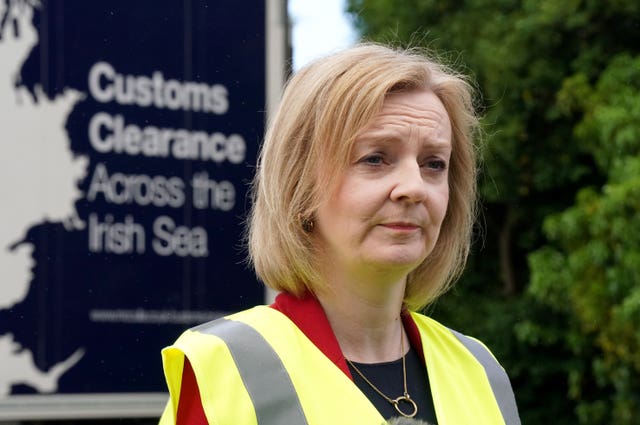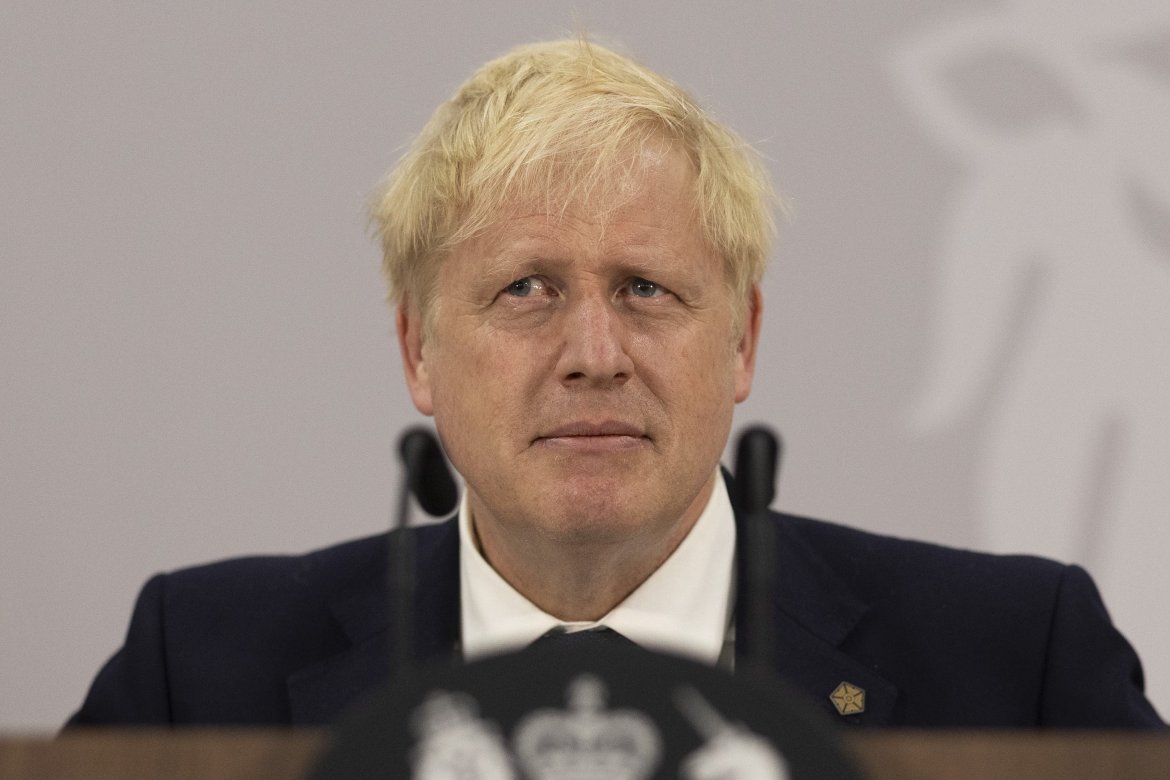MPs on Monday will debate new legislation to give ministers the power to override parts of the post-Brexit deal on Northern Ireland – with the Prime Minister suggesting the controversial proposals could be law by the end of the year.
Here are answers to some of the main questions as politicians appear to debate the plan in parliament.
What is the Northern Ireland Protocol?
Jointly agreed by the UK and EU, it is the part of the Brexit Withdrawal Agreement that deals with the main obstacle in the divorce talks – the Irish land border.
To keep the border free flowing, London and Brussels essentially moved new regulatory and customs checks required by Brexit to the Irish Sea.
That has introduced red tape on trade between Great Britain and Northern Ireland, creating new headaches for many businesses and enraging loyalists and unionists who claim the region’s place in the UK has been undermined.
Politics at Stormont has been thrown into turmoil, with the DUP blocking the formation of a new power-sharing executive, following last month’s Assembly election, in protest.
There have been sporadic outbreaks of violence linked to the protocol since its introduction in January 2021, but they have not been widespread or sustained.
What is it to do with the Good Friday Agreement (GFA)?
The debate over the protocol has increasingly been framed by competing interpretations of Northern Ireland’s historic 1998 peace accord.
The agreement contains provisions to protect and develop relations both on a north/south basis on the island of Ireland and on an east/west basis between the island and Great Britain.
Those who campaigned against Brexit claimed it would undermine the peace deal by disrupting that north/south dynamic.
The protocol, from their point of view, has helped to uphold the 1998 accord, and any threat to the arrangements would also represent a threat to the GFA.
This argument is employed by the anti-Brexit parties in NI, the Irish Government, the EU and the US administration.
For unionists in Northern Ireland, it is the protocol itself that poses the threat to the GFA.
For them, it not only undermines the east/west relationship but also strikes at another fundamental tenet of the deal – that Northern Ireland’s constitutional status cannot be changed without the consent of its people.
Unionists claim the new trade border has effectively changed the constitutional status of NI and, in so doing, undermined that consent principle.

What about the Government’s position?
Having initially hailed the protocol as the breakthrough that “got Brexit done”, and then portrayed early disruption as “teething problems”, the Prime Minister began to change his public stance on the protocol soon after it became operational.
He now claims it has upset the GFA’s “delicate balance” of unionist and nationalist aspirations by undermining the east/west dynamic.
Mr Johnson says the arrangements need to be fixed, not scrapped, maintaining that the Government’s preferred outcome is a negotiated settlement with the EU.
The Prime Minister, as well as Foreign Secretary Liz Truss and Northern Ireland Secretary Brandon Lewis, have stressed that their priority with the legislation is the restoration of power-sharing.
Protracted negotiations between the UK and European Commission have been rumbling on for well over a year without sign of resolution, with both sides having tabled proposals which the other has rejected.
The proposals, which MPs will vote on, is something of a solo run and lacks buy-in from Labour, non-unionist parties in Northern Ireland and European leaders.
Mr Johnson, who has previously described this tactic as an insurance policy that will only be used if Brussels fails to change position, has signalled that the plan could potentially be in operation by the end of the year.
What has the Government proposed?
The creation of green and red channels would differentiate between GB goods destined for use in Northern Ireland and shipments bound for onward transportation across the Irish border.
Goods arriving through the green channel would be freed of red tape, while the red channel would retain the checks and inspections required by the protocol.
The introduction of a dual regulatory system would allow businesses selling in Northern Ireland to choose whether they comply with EU standards, UK standards or both.
Changing rules on state subsidies and VAT and excise duties would ensure Northern Ireland is not excluded from UK-wide policy decisions in these areas as a result of EU laws.
Reform of the protocol governance arrangements would remove the European Court of Justice as the final arbitrator in any future trade disputes over the protocol.
Are the proposals legal?
The Government’s critics claim the unilateral move to breach the Brexit treaty by way of domestic legislation is a clear violation of international law.
Insisting it is acting within the law, the Government has cited a “doctrine of necessity” that allows obligations in international treaties to be set aside under “certain, very exceptional, limited conditions”.
This has not stopped widespread criticism of the move, with Labour leader Sir Keir Starmer pledging that his party would scrap the legislation if it was in power.
Is it all about trade and Northern Ireland?
The progress of the legislation, as well as some of the bullish rhetoric accompanying it, has inevitably seen links drawn between it and the embattled premiership of Mr Johnson.
Even before the two by-election defeats and the shock resignation of a Cabinet minister, sceptics claimed that Mr Johnson was primarily motivated by desperation to hang on to the keys of Downing Street, with the PM pandering to the Eurosceptic ranks of the Conservative Party in a bid to secure their backing.
Critics also suggest Ms Truss’s own leadership ambitions may be a factor in her hardline approach to the EU on the protocol.
For his part, Mr Johnson has forcedly rejected such a characterisation.
“Do you really think that most Conservative MPs or most people in the country are thinking about this problem? They’re not,” he told reporters during a recent visit to Rwanda.
“I’m afraid to say that this is an issue that is entirely to do with the balance of the political situation in Northern Ireland. And we have to respect that.”
NI Protocol Bill returns for 2nd reading today.
It will fix problems the Protocol has created in Northern Ireland & uphold the Belfast (Good Friday) Agreement. Our preference remains a negotiated outcome, but EU continues to rule out change to Protocol👇https://t.co/zF53dBfirx
— Liz Truss (@trussliz) June 27, 2022
What is the EU’s view?
Brussels has been highly critical of the UK’s use of unilateral action.
There are concerns the dispute could spiral into a full-blown trade war, but such an outcome still appears a way off.
Mr Johnson has in recent days played down the extent of EU anger, labelling it as “muted” and indicating that a row over the protocol is not expected to overshadow proceedings at the G7 summit of world and European leaders.
Nonetheless, the EU has instigated legal action against the UK in retaliation against the proposed legislation.
Is there any common ground between the EU and UK?
In proposals published by the European Commission last October, Brussels acknowledged a need to treat goods destined for use in Northern Ireland differently from those “at risk” of entering its single market.
However, the EU only envisaged a reduction on checks for goods arriving through an “express” channel, not a complete discontinuation.
The EU has also moved to pass legislation to remove barriers on GB medicines travelling to Northern Ireland.
The commission has shown little appetite for minimising the role of the Court of Justice of the European Union in protocol oversight.
What about businesses in Northern Ireland?
Those involved in bringing goods in from GB have experienced disruption to trade and would welcome a reduction in bureaucracy.
However, other companies that trade with Europe have benefited from the protocol’s dual market access provision, which allows them to sell unrestricted into the EU single market.
Food producers whose operations involve cross-border movements on the island of Ireland have also expressed concern at any attempt to undermine the functioning of the protocol.
What all businesses are at one on is the need for stability and certainty on their post-Brexit trading environment.

Is a return to power-sharing in Northern Ireland likely?
The DUP is watching closely both the contents of the protocol Bill, as well as the passage it makes through parliament.
Yet the exact conditions or timeline that could see the DUP return to power-sharing remains relatively opaque, with the party instead stressing that it needs to see tangible delivery on removing the so-called Irish Sea border.
DUP leader Sir Jeffrey Donaldson has previously said his party will take a “graduated and cautious” approach when judging the Government’s actions.
The party has been burned by promises from Mr Johnson before, most famously his pledge never to agree to a Brexit deal that created economic barriers in the Irish Sea.
In recent days, Secretary of State Brandon Lewis has raised the spectre of legislation to cut MLA pay if Stormont is not restored.
It remains to be seen if and when that threat is followed through, but the DUP has insisted it will not be forced back into power-sharing without sufficient action on the protocol.


